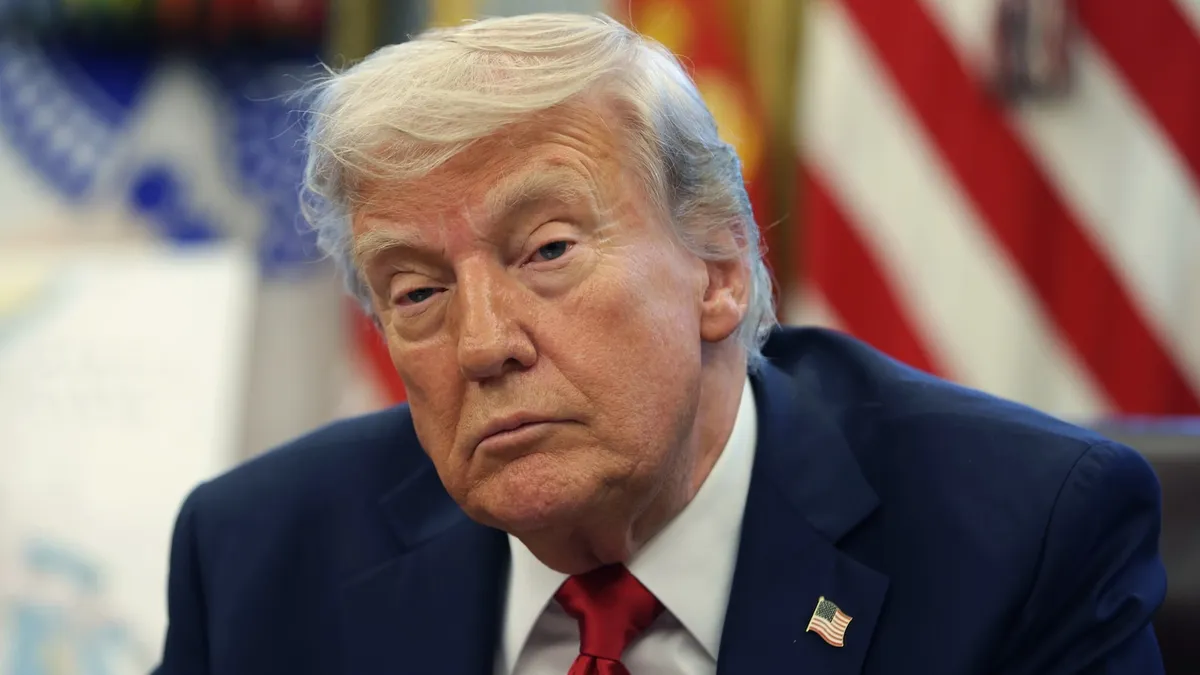
According to a recent ABC News/Washington Post/Ipsos poll, former President Donald Trump has recorded the lowest job approval rating within the first 100 days of any president in the past 80 years. With growing public discontent regarding many of his policies and significant economic challenges, including widespread fears of a recession, Trump's approval rating has fallen to 39%, down 6 percentage points since February. In contrast, 55% of respondents disapprove of his performance.
Trump's economic policies are a significant concern for the public. The poll indicates that 72% of respondents believe that his policies are very or somewhat likely to lead to a recession in the short term. Furthermore, 73% of participants described the current economy as being in poor condition, with 53% stating it has worsened since Trump took office. Alarmingly, 41% of individuals reported that their personal finances have deteriorated, a statistic comparable to the discontent seen during President Joe Biden's administration last summer.
Additionally, 62% of respondents noted rising prices, an issue Trump promised to address during his campaign. A significant 71% of participants viewed his tariffs as contributing to inflation. Only 31% of those surveyed accepted Trump's assertion that the economy would emerge with a stronger foundation in the long run.
Negative sentiments extend beyond economic issues. A substantial 65% of respondents believe Trump's administration is attempting to evade compliance with federal court orders, while 64% feel he is overstepping his bounds in expanding presidential powers. Furthermore, 62% of individuals expressed doubts regarding the administration's respect for the rule of law.
Concerns about Trump's governance continue with 58% of respondents fearing that he will excessively reduce the government's size and role. Additionally, 56% believe he is acting beyond his presidential authority, and 55% doubt his commitment to protecting citizens' rights and freedoms.
The survey reveals that between 57% to 67% of Americans disapprove of Trump's handling of six out of seven issues assessed, including stock market volatility, tariffs, foreign relations, and the overall economy. Notably, 53% disapprove of his approach to immigration. The public strongly opposes various administration initiatives, peaking at 77% against cuts in federal funding for medical research.
On university governance, the public overwhelmingly sided with Harvard University over the Trump administration in a recent dispute, with 66% supporting the university's stance.
Trump's current approval rating of 39% closely aligns with his first-term average of 40%, sharing the lowest presidential career average with President Biden. Notably, only 21% of respondents strongly approve of Trump's performance, marking his lowest percentage on record, while 44% strongly disapprove.
Among non-college-educated white men, a key support demographic, Trump's approval stands at 54%, reflecting a decline in economic sentiment as 43% of this group perceive the economy has worsened under his leadership.
Despite his low approval rating, Trump outperforms Democrats in Congress regarding public trust to address the nation’s primary challenges, with 37% trusting him compared to 30% for the Democrats. A significant 60% of respondents consider Trump out of touch with most people's concerns, yet 69% believe the Democratic Party is even more detached.
Independents play a crucial role in shaping these perceptions, with 62% viewing Trump as out of touch, while 76% express similar sentiments about the Democratic Party. This divide emphasizes the need for both parties to adapt to the changing political landscape.
In the realm of legal challenges, a majority of the public rejects Trump's claims of judicial interference, with 62%-35% asserting that federal judges are enforcing limits on his authority rather than obstructing it. Furthermore, 67%-31% believe judges should have the power to block policies they suspect may harm citizens until legal proceedings are resolved.
Concerns regarding presidential overreach are prevalent, with 58% of respondents fearing Trump may reduce the size and role of the federal government excessively, mirroring attitudes observed during Biden's term.
Lastly, the survey revealed that 49% of respondents think Trump has weakened U.S. leadership globally, while 46% feel his approach to Russia is too lenient. The results reflect ongoing divisions in public opinion regarding Trump's foreign policy initiatives.
Overall, this comprehensive poll sheds light on Trump's current standing among the American public, revealing significant challenges ahead as he navigates his presidency in an increasingly divided political landscape.